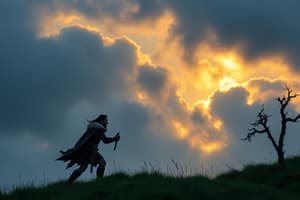Podcast
Questions and Answers
Which poem explores the theme of resistance against fate and emphasizes the inevitability of death?
Which poem explores the theme of resistance against fate and emphasizes the inevitability of death?
- tomorrow tomorrow and tomorrow (correct)
- Blow, Blow blow thy winter wind
- life in 999
- fall of satan from paradise lost
In which work does the character Grendel appear, symbolizing primal chaos and monstrosity?
In which work does the character Grendel appear, symbolizing primal chaos and monstrosity?
- beowulf (correct)
- our revels now are ended
- sonnet 116 and 130
- federicko's falcon
What is the primary focus of the prologue from the Canterbury Tales?
What is the primary focus of the prologue from the Canterbury Tales?
- A hero's journey through battle
- The manipulation of love and relationships
- An exploration of different social classes (correct)
- A scholarly debate on morality
Which Shakespearean sonnet addresses the nature of true love, contrasting it with superficial ideals?
Which Shakespearean sonnet addresses the nature of true love, contrasting it with superficial ideals?
Which phrase best summarizes the atmosphere conveyed in 'our revels now are ended'?
Which phrase best summarizes the atmosphere conveyed in 'our revels now are ended'?
Flashcards
Shakespeare's Sonnets
Shakespeare's Sonnets
A collection of 154 sonnets, famous English poems.
Paradise Lost
Paradise Lost
An epic poem about the fall of Satan.
The Canterbury Tales
The Canterbury Tales
A collection of stories by Geoffrey Chaucer.
Beowulf
Beowulf
Signup and view all the flashcards
Hamlet's famous quote
Hamlet's famous quote
Signup and view all the flashcards
Study Notes
Literary Works and Themes
- "Blow, Blow, Blow thy Winter Wind": A lyrical poem, likely focused on themes of nature, perhaps love or loss.
- "Full Fathom Five": Likely a line from a dramatic poem or play, possibly indicating a watery/deep setting.
- "Fear No More the Heat, the Sun": Suggests a theme of overcoming death or earthly suffering, or relief from hardship.
- "Fredericko's Falcon": Likely refers to a literary character, or a poem. The focus could be on hunting, heroism, or skill.
- "Beowulf": Epic poem, likely featuring heroic deeds, battles, and perhaps themes of good versus evil.
- "Grendel": A character or creature potentially from Beowulf, signifying a monstrous adversary.
- "Life in 999": Focuses on daily life in the year 999. Possible themes include societal structures, occupations, or daily routines.
- "A Grim's Struggle": Likely features a character named Grim facing a difficult struggle. Themes might include adversity, resilience, or triumph over obstacles.
- "Beowulf Part 2": Implies a continuation of the narrative of the epic poem Beowulf.
- "Sonnets 116 and 130 - Shakespeare": Two sonnets by William Shakespeare; Sonnet 116 likely explores themes of love's constancy, and Sonnet 130 contrasts conventional ideals of beauty.
- "The Fall of Satan from Paradise Lost": Depicts Satan's expulsion from Heaven. Themes include rebellion, sin, and free will.
- "Prologue from Canterbury Tales": Introduction to a collection of stories. Likely covers the collection's setting, characters, and narrative drive.
- "To Be or Not to Be": Well-known line from a play; explores the theme of existential angst and a character's internal struggle.
- "Tomorrow, Tomorrow, and Tomorrow": Suggests themes of time, delay, or the passage of time are key.
- "Saint Crispin's Day": Probably the name of a literary work, which references a historical or religious figure or event.
- "Our Revels Now are Ended": Suggests a play or poem ending, emphasizing the fleeting nature of joy, celebration, or youth.
Potential Interconnected Themes
- Several titles refer to well-known works of English literature.
- Themes like good versus evil, heroism, love, loss, struggle, and the nature of human existence are suggested.
- The titles suggest a range of time periods and literary forms. A study of this list may reveal thematic connections across different literary works.
Studying That Suits You
Use AI to generate personalized quizzes and flashcards to suit your learning preferences.




